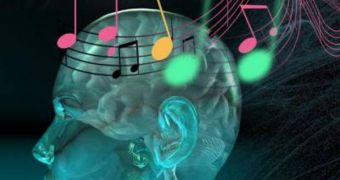Over the past few years, as research into the influence that simple things have on the human brain has developed, scientists have begun to focus on the effects of music and sound on our subconscious and conscious minds. Studies have showed that this field of investigation holds a lot of promises for results, and numerous enterprises capitalizing on recent finds have already been set up. One such enterprise has been conducted by Department of Homeland Security's Science & Technology Directorate (S&T), which has created the Brain Music program.
Basically, it makes use of the knowledge that each individual brain has its own soundtrack, which considerably varies, according to mood, frame of mind and other such features. At each given time, the tempo and tone of this soundtrack will vary, but the experts at DHS say that they are currently working on a new neurotraining program that will be based on creating predefined tunes from a participant's own brain waves, to be played back to them in stressful, desperate, or very intense situations.
This approach to calming people down could benefit personnel such as firemen, emergency crews, as well as other professional categories. Depending on the situation, they could have a melody made up of their own brain waves played back to them. In addition, Brain Music could also be used to treat common medical conditions such as insomnia, fatigue and headaches, which plague millions around the world. What the neurotraining actually does is help the brain move out of an anxious state, in which it's plagued by fear, into a more relaxed one, where it can function better, and take the best decisions.
“Strain comes with an emergency response job, so we are interested in finding ways to help these workers remain at the top of their game when working and get quality rest when they go off a shift. Our goal is to find new ways to help first responders perform at the highest level possible, without increasing tasks, training, or stress levels,” Robert Burns, who is the S&T program manager, explained.
When a person receives their melodies, they get two 2.6-minute tracks, one that is slower and soothing, and another one that is alert. The songs are custom-made for each individual, and experts at the Human Bionics LLC of Purcellville, VA enterprise, who are in charge of recording the brain waves, give each of their clients a very strict listening schedule. The songs can be played back at home or at work, and are designed to increase productivity or to prevent people from succumbing to stress.

 14 DAY TRIAL //
14 DAY TRIAL //